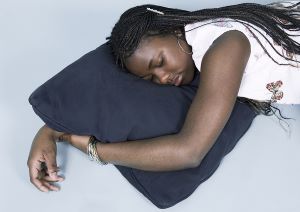 A new study published in the Journal of Clinical Sleep Medicine compared the burden of sleep disorders among a cohort of US transgender and cisgender youth.
A new study published in the Journal of Clinical Sleep Medicine compared the burden of sleep disorders among a cohort of US transgender and cisgender youth.
“We were looking for any differences in sleep disorders between cisgender and transgender youth and between transgender people using and those not using gender-affirming therapy,” study author Dr. Ronald Gavidia, M.S., M.S. told us. Dr. Gavidia is sleep medicine physician in the University of Michigan Health Department of Neurology Division of Sleep Medicine, and assistant professor of neurology at U-M Medical School.
Researchers expected to see a higher burden of sleep disorders among transgender youth in comparison to cisgender people. They also expected to see a lower prevalence of sleep disorders among transgender people who pursued gender-affirming therapy. This hypothesis was based on previous reports that linked improved mental health and lower insomnia burden to gender-affirming therapy.
“The transgender community endures a high burden of poor mental health which strongly influences sleep,” study author Dr. Galit Levi Dunietz, Ph.D., M.P.H. told us. Dr. Dunietz is epidemiologist in the University of Michigan Health Department of Neurology Division of Sleep Medicine and assistant professor of neurology at U-M Medical School. “We also wanted to address the heterogeinety in this community. For example, some transgender people pursue gender-affirming therapy that could influence their sleep.”
To test their theory, researchers utilized the Optum Clinformatics Data Mart Database —a national single private payer administrative claims database— to identify cisgender and transgender youth, their diagnosis of sleep disorders, and the use of gender affirming therapy among transgender people by International Classification of Diseases and medical procedural codes.
“We observed that transgender youth were four times more likely to have any sleep disorder in comparison to cisgender youth,” Dr. Gavidia told us. “Specifically, transgender youth were five times more likely to have insomnia and three times more likely to have sleep apnea and other sleep disorders (hypersomnia, parasomnia, circadian rhythm, and sleep movement disorders) relative to cisgender people. We also found that gender-affirming therapy was associated with significant improvement in sleep disorders. For example, the odds of insomnia among transgender people on this therapy decrease by 50%.”
Researchers expected to see a high burden of sleep disorders among transgender youth and a prevalence of insomnia among those receiving gender-affirming therapy. However, the team said findings on sleep apnea and other sleep disorders were less pronounced and will need additional evaluation.
“We would like to see studies that examine multiple dimensions of sleep health using objective methods, for example, sleep duration, timing and sleep variability,” Dr. Dunietz told us. “In addition, insomnia is a sleep disorder that could be acute or chronic with several symptoms such as trouble falling asleep or staying asleep. We need to understand the type of insomnia and which symptoms impact these youth.”
To determine if gender transition improves sleep health and well-being, sleep and mood need to be assessed before and after gender-affirming therapy. Poor sleep could have behavioral or pathological determinants or both. It is important to uncover the burden of all aspects of sleep health among transgender people and their implications.
“I would like to raise the awareness of the transgender community to the higher risk of sleep disorders and the potential protective role of gender-affirming therapy on insomnia,” Dr. Gavidia told us. “For those with insomnia or other sleep complaints, I would encourage them to seek a professional evaluation. I urge healthcare providers to screen transgender people for the presence of sleep complaints and refer them to a sleep specialist when appropriate.”
Patricia Tomasi is a mom, maternal mental health advocate, journalist, and speaker. She writes regularly for the Huffington Post Canada, focusing primarily on maternal mental health after suffering from severe postpartum anxiety twice. You can find her Huffington Post biography here. Patricia is also a Patient Expert Advisor for the North American-based, Maternal Mental Health Research Collective and is the founder of the online peer support group - Facebook Postpartum Depression & Anxiety Support Group - with over 1500 members worldwide. Blog: www.patriciatomasiblog.wordpress.com
Email: tomasi.patricia@gmail.com